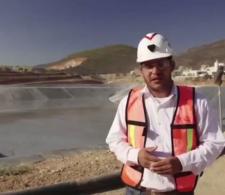
Gold Resource Corp moves on from strike, helped by ongoing CSR
There’s often a tension in business between the community needs and the urge to profit.
But it need not be too severe, as the recent experience of Gold Resource Corporation makes plain.
Gold Resource Corp operates the Arista silver, gold and base metals mine in Oaxaca State, southern Mexico, and it’s done very well out of it too.
Since 2010, the company proudly boasts, it’s paid out more than US$107 million in dividends to shareholders.
Not a bad return on a company that’s not actually capitalised at much more than that on the New York Stock Exchange.
But does that return come at any other sort of cost?
An interesting answer to that question was showcased at the Arista mine in May this year, when certain elements of the workforce went on strike.
The striking workers were protesting that the annual bonus paid out by the company had been reduced in response to weaker metals prices.
No argument that metals prices are weaker: gold is down by around 10 per cent over the year, and silver down by slightly more.
But was cutting workers bonuses an appropriate response to this wider market dynamic?
No one likes to be paid less than they were paid last year.
And it’s perhaps a little bit galling for workers - if any of them are looking at Gold Resource’s financial results - that the company keeps on trumpeting just how much money it is returning to shareholders.
A return on investment is all very well, but if that return is being delivered at the expense of workers who are in turn minded to disrupt operations, then the pay-off longer-term is likely to be muted.
But as ever, the real situation is a little more nuanced.
Yes, there was significant disruption in May. But actually the strike was not officially sanctioned by the mine’s union and operations resumed after only one day of stoppage.
In total between 80-to-100 union members blocked access to the mine, but for just one day.
That amounts to less than a third of the company’s workforce actually turning out in protest, given that there are more than 300 workers at the mine.
How representative the ones on the picket line were of the others is open to question.
But the fact that work resumed after only one day and that there has been no disruption since tells its own story.
Because although bonuses at Arista may have been cut, workers won’t be unaware that in the wider context of the mining industry out and out redundancies are becoming more and more common as lower metals prices force bosses to cut costs.
Set against the loss a job, the loss of a bonus suddenly seems less of a burden.
But there’s more to it than that.
The company has made strenuous efforts to play a significant role in the local life and culture of the community.
This is not a project that works in isolation of the people around it, surrounded by the high fences of capitalism.
Rather, as the video here [https://vimeo.com/79149908] makes explicit, the company is embedded in the community and has helped it get connected with a substantial contribution towards the installation of cellphone coverage.
Does this kind of work stop strikes?
Not really, since the correspondence of issues is hardly clear. But what it can do is mitigate any bitterness when disputes do arise, making stoppages short, to the point, and non-violent.
A community that has been invested in by the local mine will, to use the language that accountants understand, repay that investment in intangible ways.
It may be hard to measure, but a sign of good CSR is as often evidenced by the absence of deep division as it is by the bricks and mortar of new schools or mobile phone masts.
There have been no further stoppages at Arista.





